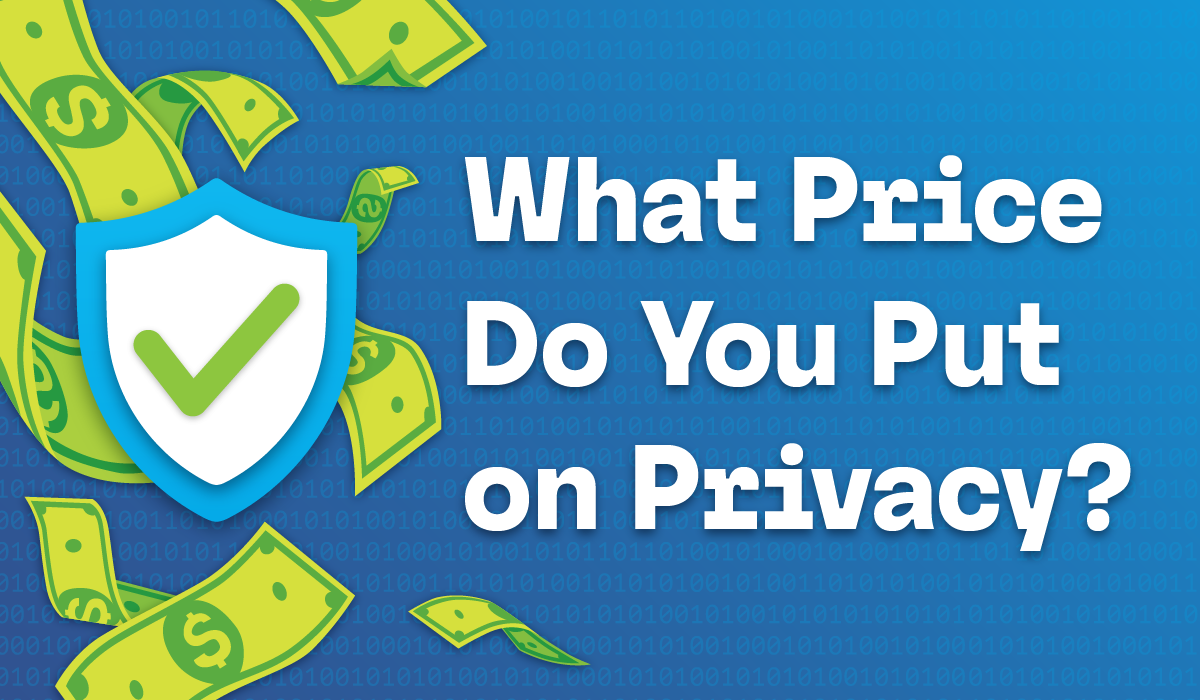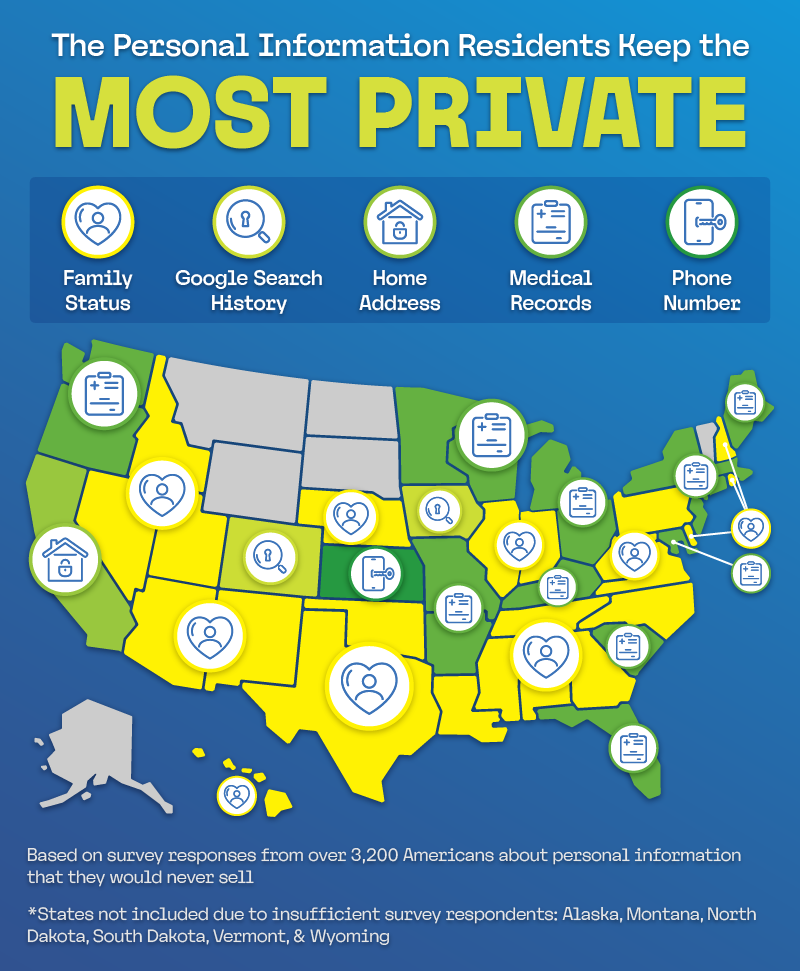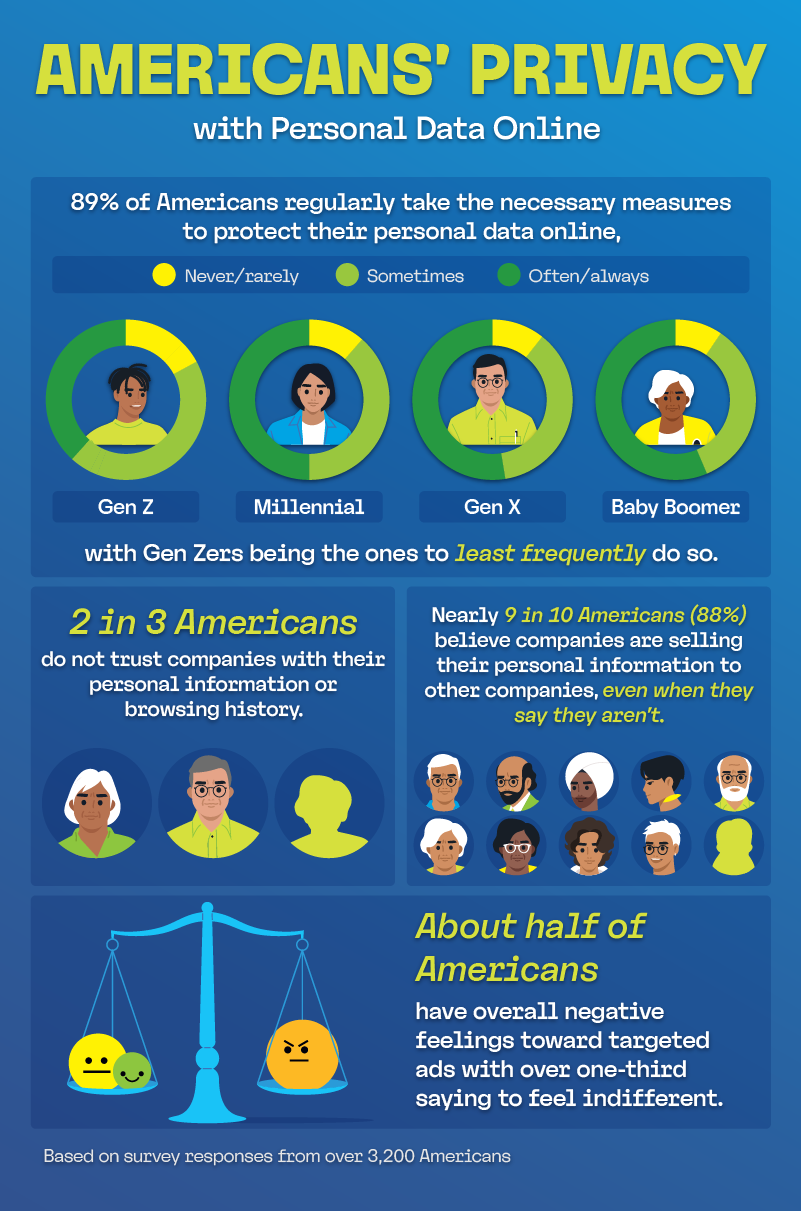
Our privacy is important. In this digital age, the value of protecting our sensitive personal data from outside sources has become paramount. With online companies and insurance providers alike eager to leverage this information for various purposes, the issue of privacy remains a prevalent one for people concerned about data being too accessible. Furthermore, our data can now be bought and sold, which begs the question: if we could put a price on our data, what would it be, and is some information more important than others?
To find out, we surveyed over 3,200 Americans across 44 states to gain insight into the value of privacy and different personal information. We asked participants how much they would sell their home address, phone number, browsing history, medical records, and more. This data was analyzed to determine which information is most important and how much it is worth by state.
Key Findings
It’s safe to say most Americans don’t trust companies with their personal information, with over two-thirds of participants claiming this to be true. Trust issues run deep as 9 in 10 Americans believe companies are selling their personal information even when these companies claim not to. Some people go so far as to create fake phone numbers or emails (often to get special discounts and offers), with 57% of respondents indicating they would do so.
Gender and age certainly play a role in how people value their privacy. For instance, our survey indicated that men would charge their significant other more than five times the rate women would to see their browsing history.
When it comes to location sharing, Americans share their location with nine people on average, and men share with twice as many contacts as women. Females are also twice as likely to give out a fake number to someone pursuing them than men. As for age, data protection measures are split among age groups, with younger generations less likely to have different passwords for personal logins.
Personal Data Privacy According to Every State
The Personal Information Residents Would Never Sell & Most Willing to Sell
When evaluating the hierarchy of private information, family status (i.e., the status of being in a parent and child relationship) made it to the top and proved to be the most private information among 23 states. Medical records were close behind, with 17 states indicating this was the most valued piece of information. Surprisingly, residents in Colorado and Iowa deviated from this trend and claimed Google Search History was their most valuable personal information. Kansas and California were also outliers. Kansas residents claimed phone numbers as their number one piece of personal information they would never sell, while California residents had home addresses as their number one.

Home addresses, phone numbers, medical records, and family status were the personal information residents were least likely to sell. However, nationally, email addresses (59%), shopping histories (50%), and birthdates (37%) are information Americans were most willing to sell to businesses.
The Price Each State Would Put on Their Personal Information
Can a price really be put on our privacy? Apparently, it can. With a maximum amount of $100 million in mind, results showed family status was priced the highest at $6.9 million. Next was medical records, with an average price of $5.8 million. Following this was Google search history at $2.7 million, home address at $1.6 million, phone numbers at $1.56 million, and email addresses at $943,977.
Shopping history can show consumer choices and lifestyles. In some cases, the sites a person visits have the power to reveal consumer financial status and priorities. However, despite these factors, shopping history had the lowest price average at $892,719.
Two of the highest prices placed on information overall were Massachusetts’ average price on medical records and North Carolina’s average price on family status, both around $17 million.
Google searches can reveal a lot about a person, from their interests to their health issues. With rampant cyberattacks and data breaches, it is no wonder why Google search history placed third in price. In particular, Massachusetts and Rhode Island highly valued search history with an average of around $8.3 and $8.4 million, respectively.
How Americans Protect Their Privacy Online

Secure messaging tools, strong passwords, and two-factor authentication are just some ways to keep your privacy safe. But how many people actually use privacy tools and practices? According to a study by Pew Research Center, 36% of participants use encrypted messaging services, and 44% use a browser that doesn’t track their online activity.
Most Americans feel confident they are safeguarding their privacy. According to our study, 90% of Americans say they regularly take the necessary measures to protect their personal data, with Gen Zers least likely to do so. When asked if they disable apps from tracking their phone, 41% said they disable “most” apps, 31% said they disable “some”, and 20% said they disable “all.” Additionally, over three-quarters (79%) of participants said they regularly accept all or some cookies when given the option, even though most do not feel confident trusting businesses with their personal data. And while most cookies are safe, some can be used by cyberattackers.
Closing Thoughts
Data privacy plays a critical role in our lives and in the role of our life insurance. Insurance companies need to collect and process the personal information of policyholders to function, so ensuring the privacy and security of this information is important. When it comes to the sale of life insurance policies, trust and confidence in privacy safeguards are essential to ensure financial interests are protected. See if you qualify to sell your life insurance policy today.
Methodology
In late 2023, we surveyed 3,214 Americans across 44 states to gather information on their preferences and tendencies concerning the privacy of personal information. We asked questions related to privacy among peers, the public, and online data shared with businesses. It’s worth noting that due to their lower populations, we did not receive enough responses from Alaska, Montana, North Dakota, South Dakota, Vermont, and Wyoming to gain meaningful insights.
